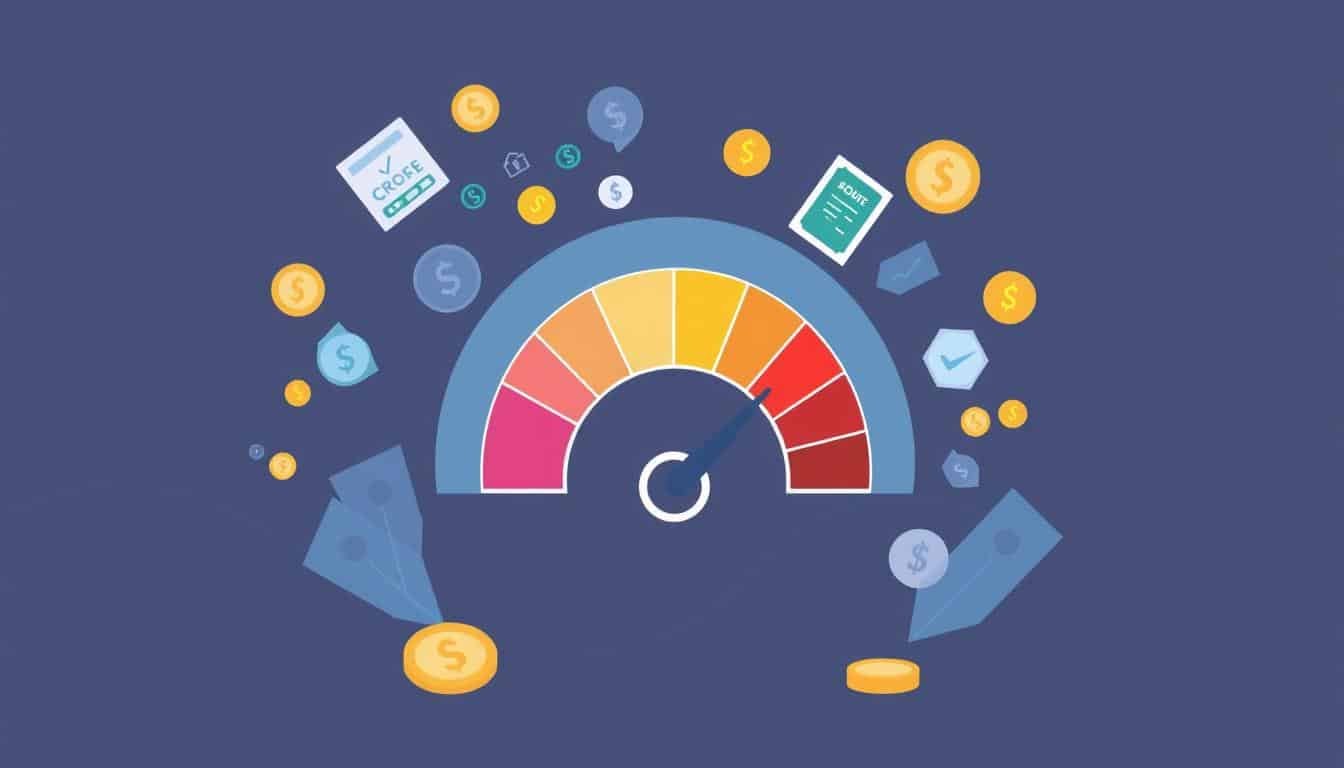Loan Eligibility Requirements Getting a personal loan can be easy if you meet the lender’s needs. Lenders look at your credit score, financial health, and if you can pay back the loan. Knowing what they want and working on your profile can help you get approved.
Key Takeaways
- Credit score and payment history are critical factors lenders consider for personal loan approval.
- Maintaining a low debt-to-income (DTI) ratio, typically below 36%, is crucial for loan eligibility.
- Borrowers with a credit score of 700 or above are generally viewed as creditworthy by lenders.
- Steady employment history and documentation of income sources can boost your loan application.
- Effective debt management strategies, such as reducing credit utilization, can enhance your overall financial profile.
Understanding Your Current Credit Profile
Checking your credit profile is key to getting better loan offers. Knowing what affects your credit score helps you improve. This way, you can increase your chances of getting approved.
Checking Your Credit Report for Errors
Errors on your credit report can hurt your score. In fact, one in five Americans have credit report errors. It’s important to review your report from Equifax, Experian, and TransUnion. Dispute any mistakes right away.
Impact of Payment History on Credit Score
Payment history is crucial, making up 35% of your FICO score. Always pay on time for all accounts, like credit cards and loans. This keeps your credit strong.
Credit Utilization and Its Importance
Your credit utilization ratio is 30% of your score. Keep it under 30% to show you manage credit well. If it’s high, ask for a credit limit increase. This can help without needing to pay down balances.
Knowing your credit profile’s key parts helps you improve your loan chances. You can get better terms this way.
Boosting Your Income and Financial Stability

Improving your income and financial stability can help you get loans easier. Lenders look at how well you can pay back on time. This depends on your income and debt-to-income ratio (DTI).
Try getting a side job or asking for a raise at your main job. Income from part-time work, alimony, or child support helps lenders see your financial health. More income and less debt can lower your DTI, making lenders more likely to approve your loan.
Keep your DTI below 36%, but some lenders might accept up to 43%. Showing you have steady income from jobs, self-employment, or investments helps lenders trust you can repay the loan.
| Metric | Ideal Range | Acceptable Range |
|---|---|---|
| Debt-to-Income Ratio (DTI) | 36% or less | Up to 43% |
| Minimum Credit Score | 620+ (conventional loans) | 580+ (FHA, VA, USDA loans) |
| Income History | Consistent for 2+ years | Projected to continue for 3+ years |
Boosting your income and keeping your finances stable can greatly improve your loan chances. You’ll also get better loan terms.
“Increasing your income and reducing your debt are the two most powerful ways to enhance your loan eligibility and secure more favorable terms.”
Meeting Loan Eligibility Requirements

When you apply for a loan, lenders check several important factors. Knowing these can boost your chances of getting the loan you want.
Minimum Credit Score Thresholds
Your credit score is a big deal. Scores range from 300 to 850. A score over 750 is top-notch. Scores from 640 to 749 can get you good loan terms.
Debt-to-Income Ratio Standards
Lenders look at your debt-to-income (DTI) ratio too. This ratio compares your monthly debt to your income. Aim for a DTI under 36%. But, some lenders might accept up to 40%.
Employment and Income Documentation
Lenders also check your job and income proof. They want to see you can pay back the loan. This might include pay stubs, tax returns, or financial statements. Having solid income proof is key for approval.
By knowing and meeting these loan requirements, you can increase your chances of getting the financing you need.
| Loan Requirement | Typical Standard | Potential Exceptions |
|---|---|---|
| Credit Score | Minimum 640 | Some lenders may consider scores as low as 600 |
| Debt-to-Income Ratio | Under 36% | Up to 40% may be acceptable for some lenders |
| Income Verification | Pay stubs, tax returns, and other financial statements | Alternative data like education or employment history may be considered in some cases |
“Understanding and meeting specific eligibility criteria is crucial to securing the financing you need.”
Strategic Debt Management for Better Approval Odds

When you apply for a personal loan, your debt profile matters a lot. Lowering your total debt and keeping your credit utilization low can help. Consolidating high-interest debts into one, lower-interest loan can also improve your debt-to-income ratio. This makes your loan application more attractive to lenders.
It’s also important to avoid new credit applications before you apply for a loan. Each new application can temporarily lower your credit score. This could hurt your chances of getting the loan you need. By focusing on debt reduction and credit utilization, you can show lenders you’re a better borrower. This can lead to better loan terms for you.
| Debt Management Strategy | Potential Benefits |
|---|---|
| Debt Consolidation Loans | – Combine multiple debts into a single, lower-interest loan – Simplify debt repayment – Improve debt-to-income ratio |
| Debt Management Plans | – No credit score requirement for enrollment – Negotiated interest rate reductions – Structured repayment plan over 3-5 years |
| Debt Settlement Programs | – Negotiate reduction in total debt owed – Provide relief for those struggling with debt – Can work with bad credit |
Using smart debt management strategies can help you get a personal loan approved. These methods can make your financial profile look better. They show lenders you’re serious about managing your debt responsibly.
“Effective debt management is the key to unlocking better loan approval opportunities. By reducing your overall debt and maintaining a healthy credit utilization, you can significantly enhance your chances of securing the financing you need.”
Choosing the Right Loan Amount and Terms

When you apply for a loan, it’s key to pick the right size. Make sure the loan amount fits your financial situation. This can boost your chances of getting approved.
Interest rates on personal loans vary from 8% to 36%. They depend on your credit score. Loan terms range from 2 to 7 years. Longer terms mean smaller monthly payments but more interest over time.
Determining Appropriate Loan Size
To choose the right loan amount, look at your finances and why you need the loan. Don’t borrow more than you must. This can save you from high interest and debt.
Use online loan calculators. They help you see monthly payments and total interest for different amounts and terms.
Understanding Interest Rates and APR
When looking at loans, focus on the Annual Percentage Rate (APR). The APR shows the total cost of the loan, including fees and interest. It helps you compare loans and find the best deal.
Selecting Optimal Repayment Terms
Shorter loan terms, like 2 or 3 years, mean less interest but higher monthly payments. Longer terms, such as 5 or 7 years, make payments easier but cost more in interest. Think about your budget and goals to pick the best term for you.
| Loan Amount | Interest Rate | Loan Term | Monthly Payment | Total Interest Paid |
|---|---|---|---|---|
| $10,000 | 15% | 3 years | $347 | $2,480 |
| $10,000 | 15% | 5 years | $238 | $4,274 |
This example shows how longer terms can lower monthly payments but increase total interest. By thinking about loan amount, interest rates, and terms, you can choose wisely and get the right loan for you.
Strengthening Your Application with Co-Signers or Collateral

Getting a loan can be tough, especially if you have a thin credit file or poor finances. But, there are ways to boost your loan approval chances and get better terms. Using a co-signer or offering collateral are two smart moves to make your application stronger.
A co-signer is someone with good credit and steady income who agrees to help with the loan. Adding a co-signer can make your loan more likely to get approved. It might also get you better interest rates or more money. This is great for students or young adults who don’t have enough credit or income to qualify alone.
Or, you could look into a secured personal loan. This type of loan needs something valuable, like a car or savings, as collateral. Secured loans might be easier to get or have lower interest rates. But, remember, you could lose the collateral if you can’t pay back the loan.
“Adding a co-signer or providing collateral can significantly improve your chances of loan approval and secure more favorable terms.”
It’s important to think about the big picture when considering these options. Co-signers are on the hook for the loan too, and missed payments hurt both of your credit scores. Using collateral means you could lose something valuable if you can’t pay back the loan.
Talking to a personal banker can help you understand the co-applicant or secured loan process better. They can guide you to make a choice that fits your financial situation and goals.
Also Read: Online Loan Application Process: Quick And Easy Steps
Conclusion
To improve your loan chances, you need to tackle many financial areas. Work on your credit score, increase your income, and manage your debt well. Choosing the right loan amount, terms, and lender also matters a lot.
If your credit isn’t great, think about using co-signers or offering collateral. Knowing your finances inside out is crucial for lenders. It helps meet their strict requirements.
Using loan application tips, approval strategies, and financial preparation can help you get a mortgage. Stay informed and proactive. This way, you’ll have a smooth and successful loan application journey.
FAQs
Q: What are the basic personal loan requirements?
A: The basic requirements for a personal loan typically include a valid ID, proof of income, a good credit score, and a completed personal loan application. Specific requirements may vary by lender.
Q: How can I qualify for a personal loan with bad credit?
A: To qualify for a personal loan with bad credit, consider applying for a secured personal loan, improving your credit score, or finding a lender that specializes in loans for individuals with less-than-excellent credit. Always check the lender’s eligibility requirements before applying.
Q: What impact does my credit history have on personal loan eligibility?
A: Your credit history plays a crucial role in determining your personal loan eligibility. Lenders review your credit score and credit report to assess your risk as a borrower. A strong credit history can significantly improve your chances of getting approved for a personal loan.
Q: Can I get a personal loan without a credit check?
A: While most lenders conduct a credit check as part of the loan application process, there are some options available, such as certain credit unions or lenders that offer loans based on income rather than credit history. Be sure to understand the terms and requirements for such loans.
Q: What factors can improve my personal loan eligibility?
A: To improve your personal loan eligibility, aim to maintain a good credit score, reduce existing debt, ensure a stable income, and prepare a thorough personal loan application. Additionally, securing a co-signer with excellent credit can also enhance your chances of approval.
Q: Are there specific requirements for a personal loan application?
A: Yes, the requirements for a personal loan application typically include personal identification, proof of income, employment verification, and details about your credit history. Lenders may have additional specific requirements based on their policies.
Q: How does my credit score affect my chances of getting approved for a personal loan?
A: Your credit score is a significant factor that lenders consider when determining your eligibility for a personal loan. A higher credit score often leads to better loan rates and increases your chances of being approved for a personal loan.
Q: What are the common reasons for being denied a personal loan?
A: Common reasons for being denied a personal loan include a low credit score, insufficient income, high debt-to-income ratio, or incomplete personal loan application. Understanding these factors can help you better prepare for future applications.
Q: What types of personal loans are available for different needs?
A: There are various types of personal loans available, including unsecured personal loans, secured personal loans, and installment loans. Each type has different requirements and terms, so it’s important to choose one that aligns with your financial needs and eligibility.
Source Links
- https://www.nerdwallet.com/article/loans/personal-loans/personal-loan-application-tips-win-approval
- https://www.bankrate.com/loans/personal-loans/boost-chances-of-personal-loan-approval/
- https://www.onescore.app/blog/tips-to-improve-personal-loan-eligibility/
- https://www.investopedia.com/terms/c/credit-criteria.asp
- https://www.bankrate.com/personal-finance/credit/how-to-read-a-credit-report/
- https://www.experian.com/blogs/ask-experian/credit-education/score-basics/understanding-credit-scores/
- https://themortgagereports.com/85149/income-requirements-for-home-loan-guidelines
- https://fibrecu.com/loan-options-self-employed/
- https://agrimhfc.com/5-smart-tips-to-increase-your-home-loan-eligibility/
- https://www.investopedia.com/what-are-the-eligibility-requirements-for-a-personal-loan-7692887
- https://www.fnb247.com/education-center/news/sba-loans/sba-loan-eligibility-requirements-essential-criteria-explained/
- https://www.cbsnews.com/news/what-credit-card-debt-relief-options-work-best-with-bad-credit/
- https://www.nerdwallet.com/article/loans/personal-loans/compare-debt-management-plans
- https://www.consumerfinance.gov/owning-a-home/explore/understand-the-different-kinds-of-loans-available/
- https://www.nerdwallet.com/article/loans/personal-loans/personal-loan-term-length
- https://www.lendingclub.com/resource-center/personal-loan/guide-to-choosing-the-best-personal-loans
- https://www.usbank.com/financialiq/manage-your-household/student-center/co-signing-applying-for-loan-with-co-borrower.html
- https://www.nerdwallet.com/best/loans/personal-loans/co-sign-personal-loan
- https://myhome.freddiemac.com/blog/homeownership/20171204-4Cs-qualifying-mortgage
- https://themortgagereports.com/21489/how-to-buy-a-home-conventional-loan-mortgage-rates-guidelines





